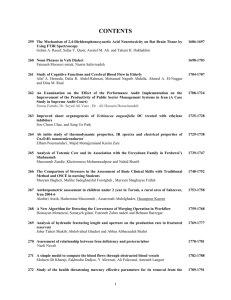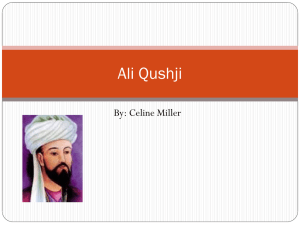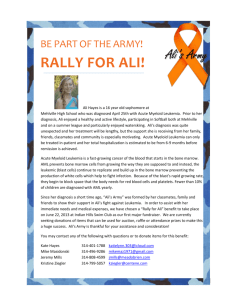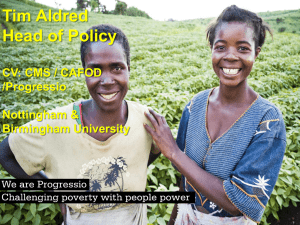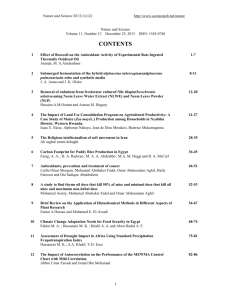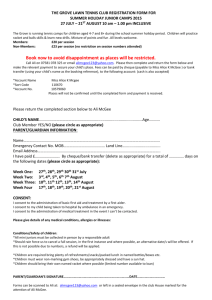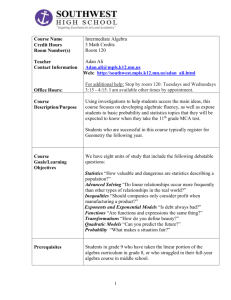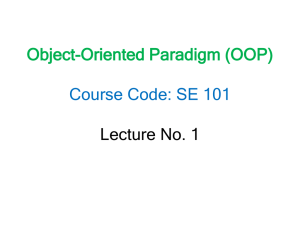AMSSA Winner
advertisement
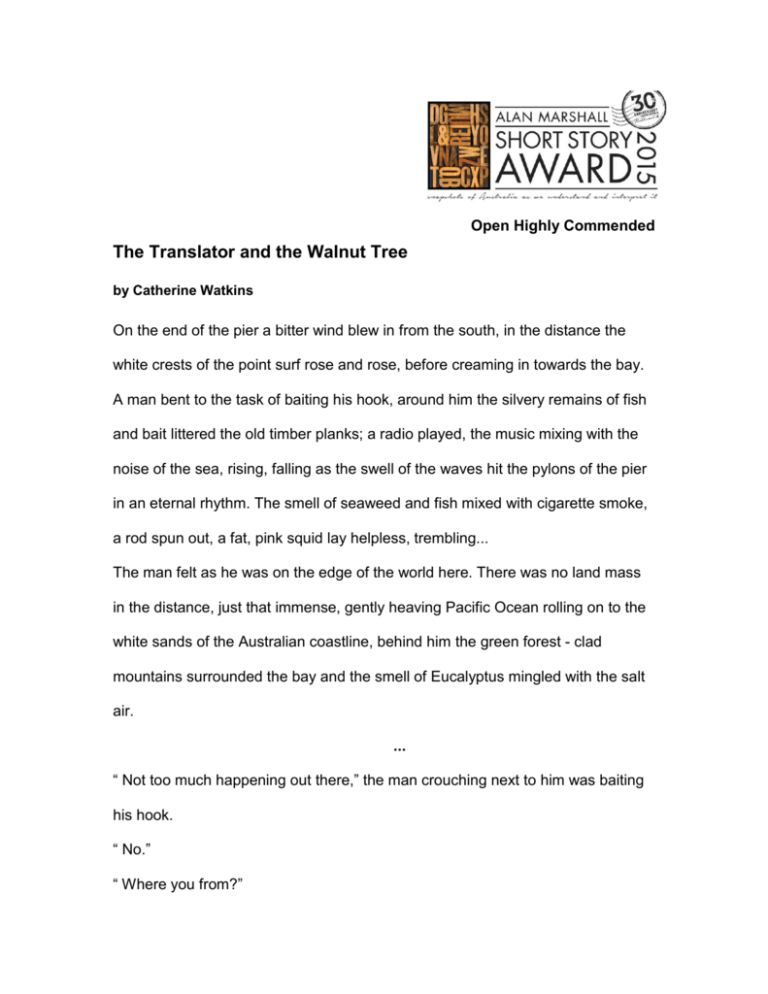
Open Highly Commended The Translator and the Walnut Tree by Catherine Watkins On the end of the pier a bitter wind blew in from the south, in the distance the white crests of the point surf rose and rose, before creaming in towards the bay. A man bent to the task of baiting his hook, around him the silvery remains of fish and bait littered the old timber planks; a radio played, the music mixing with the noise of the sea, rising, falling as the swell of the waves hit the pylons of the pier in an eternal rhythm. The smell of seaweed and fish mixed with cigarette smoke, a rod spun out, a fat, pink squid lay helpless, trembling... The man felt as he was on the edge of the world here. There was no land mass in the distance, just that immense, gently heaving Pacific Ocean rolling on to the white sands of the Australian coastline, behind him the green forest - clad mountains surrounded the bay and the smell of Eucalyptus mingled with the salt air. ... “ Not too much happening out there,” the man crouching next to him was baiting his hook. “ No.” “ Where you from?” “ Afghanistan.” There was quiet, the Australian looked up and held out a fishy hand, “Dimitri.” “ Ali.” The silence and the cold then became companionable, Ali hunched further into his jacket. He looked up as the sun dropped behind the hills in the western sky; the peace and calm, the rhythm of the waves, the sheer colour of his surroundings was at times confronting to him. “ Been here before have yer? Catch any fish?’ Ali shook his head. “Here try this,” Dimitri sliced off a small piece of tentacle from the squid and handed it to Ali. His line flew out over the water; dark settled slowly, the water took on an oily hue, on a distant promontory a light- house blinked its unwavering warning. … The long channel which carried the debris and waste from the houses on the hillside lay open to the sun. In the summer it smelled foul, filled with the detritus of life from the old city of Kabul; plastic bags entangled with faeces and rotten food, children scavenged. Ali led the donkey along the pathway which ran 1 alongside it, climbing up the hillside; two plastic containers of water straddled the donkey’s back, it picked its way carefully along the dusty path. Occasionally they stopped to rest a moment in the shade, turning to look down on the city below them, then on they went, climbing and climbing until they reached a square, flatroofed house perched on the side of the hill. Opening a gate in the high mud - brick wall, Ali and the donkey stepped into a small, dusty courtyard, its barrenness relieved only by an ancient walnut tree which spread its parched branches. Relieving the donkey of his burden, Ali ran his hand down the coarse black stripe on the animal’s back and poured some water into a metal bucket; the donkey slurped noisily. Ali then fed a little water to the tree, “there, that will have to do you,” he said, and carried the plastic containers into the house. ... “Y’speak English then... All the way from Afghanistan and y’ speak English?” “ My grandfather taught me... I worked as a translator...” His new friend nodded sagely. Suddenly his rod started to spin; Ali stood and grabbed it, “ Keep it steady, keep it steady! Ther y’ go! Easy now!” A silvery fish appeared, dangling over the water, Ali wound it in carefully until it plopped on to the pier, squirming and flapping at their feet. The two men crouched down to examine the catch, Ali threw it into his bucket as if he had been fishing all his life. 2 ... In the dark, cool room of the house the colour and noise of the old city of Kabul seemed far away. An old man sat, his unseeing eyes white and rheumy, looked silently into his past, his head turned towards the door as Ali entered. “ Boy?” Ali helped his grandfather up. “ Tell me everything you have seen this morning Boy, everything.” As Ali began to speak, the sound of an explosion rent the air, the old man turned his head towards the noise, but the fear could not register in his eyes. ... “ So yer a translator? Who did yer work for?” “ I worked with the Australian soldiers in Oruzgan, then, when they left my country they look after me and bring me here.” Ali’s voice was without emotion, as if he could negate the enormity of the impact that it had had on his life; his line danced out over the darkening sea. “ So, it’s good here eh?’’ How could Ali say that he missed the colours and smells of his country; the arid landscape with its mountains in the distance, the street vendors squatting by their wares, the cadence of language, even the bitter winters when the snow and sleet came and the wind howled up the valley. From time to time fragments of music came to him from that past, the haunting sounds of the rubab which his grandfather had once played acted as a backdrop to his memories. Time cast a rosy glow over the past, but Ali knew that he could never return to the death and 3 destruction, the violence and inhumanity of the grim regime which had sought to govern their lives. ... “ I will live as long as the donkey, his grandfather had said with a smile. “ No, you will live as long as the walnut tree.” “ Ah...you know the walnut tree can live for two hundred years?” Sometimes Ali shoveled donkey manure around the tree to give it sustenance and to help retain the moisture over the heat of summer. He was concerned that its branches would reach above the courtyard wall and that the Taliban would come and chop it down, as they had done to thousands of trees in and around the city. After the long winters he would watch out for its buds and then the catkins which drooped gracefully from the branches, it was those young shoots that gave him hope and a sense of future. His grandfather had told him stories of when Kabul was a green and fertile city when houses nestled among fruit trees. Sometimes Ali would creep into the Christian cemetery where “Infidels” were buried. Two large black gates set into a mud-brick wall led into a small, secret oasis of green, surrounding the graves; shaded by apricot and peach trees, protected from the noise and dust of the city the lush garden gave him peace and tranquillity, the high walls seemed to protect him. Ali’s fingers would trace the words carved into the gravestones and he would imagine the lives of those visitors to his world. In the summer months the keeper of the little cemetery would give him fruit from the trees and Ali would take 4 the small sweet peaches and apricots back up the hill, his pockets bulging with sunshine. ... “ So you're here fer good are yer?” Dimitri’s voice interrupted his thoughts. “ Yes, it is too dangerous for me to go back.” “ Who’d ‘ave thought it ? Here on the pier talking to someone from Afghanistan – so who did yer leave behind?” “Relations, friends, other people who worked against the regime. It is difficult to leave your country; some people did not want to, despite the fighting, others wanted to but were not allowed, I don’t know what has happened to them, perhaps I will never know.” ... Translating for the Australians had given him a sense of purpose, it had taught him that there was a world out there of which he was a part; he had moved around the countryside with the soldiers, watched them fight and watched them die; learned to laugh with them, to play cricket with them in the orange dust of the desert. His speech absorbed the casual drawl of the Australian vernacular, which mixed with his stilted English. Meanwhile his younger brother had taken over his role in the family, fetched the water each day, looked after the donkey, helped his mother and his grandfather, but the war swirled around them. “ I don’t like you doing it,” his mother had said, “you put us all at risk.” 5 “ So do we let them destroy our way of life? Destroy our country?” From Ali his grandfather read the mood of his country beyond the walls of the small house, beyond his sightless eyes; Ali’s visits home were his book to the world. “After a battle there are bodies in the market place... in people’s gardens... on people’s doorsteps, even in front of the mosque, the smell of rotting flesh hangs in the air for days, it is with me still... There are soldiers in the pomegranate orchards around Kandahar, the lush canopy of the trees shelters them, bombs are on pathways where people walk, in areas where children play, they are tightly packed with explosives, as tightly packed as the seeds of the pomegranate... and the blood is just as red...” Ali’s voice retreated into silence as his grandfather spoke... “Did you know that the Pomegranate tree grew in the Garden of Paradise? It is one of God’s gifts, a symbol of life and fertility, it should not be associated with death and destruction.” The old man’s voice took on a dream- like quality as if he could see the trees in the landscape of his past. Images emerged in his mind reconstructed from an earlier life; colors, sounds, smells came together and created a visual kaleidoscope of forms which fed his imagination. ... The pier seemed darker now, the wind was rising, an errant wave sent spray onto their faces. Ali felt at one with nature out here, there were no bodies to step over in the streets, no desperate, begging children holding out their small grubby hands. Images of his country were like a chaotic collage in his mind, sometimes 6 he was unsure of his own reality; should he be grateful to be here in this land of peace and plenty or had he been condemned to exile? White gulls soared and hovered over Ali’s head, their feathers catching the night light. Ali watched them; even the birds here were free. ... In the bird market of Kabul the birds were entrapped, cages swung from every stall, the cacophony of birdsong merged with the guttural voices of the men spruiking them; the dusty alleyways were alive with noise and color. His grandfather had spoken of exotic birds: cranes, flamingos, quail, but that was in a past life; in the privations of war even birds became a commodity. Sometimes hunters used huge nets to cover the entrance to small valleys in the mountains and whole flocks were entrapped, lured by lanterns and shards of sparkling glass placed amongst the trees. Each week Ali would lead his grandfather through the Ka Faroshi market, identifying the birds for his unseeing eyes; his grandfather insisted that Ali describe their size and their plumage in English, he would then identify them by their song, his acute sense of hearing compensating for his lack of sight. In the market they would stop to chat with the store-keepers and gather information about the state of the country. His Grandfather insisted that they went on Friday mornings when the Kowks were fighting, Ali would give a running commentary as the birds clawed, screamed and tore at each other ferociously. If they won a bet on the fight they would buy some chicken mince or even a laying 7 hen and would slowly climb the hill, Ali walking in front holding onto a rope to guide the old man home. … “Yer’ll need to fillet them fish,” Dimitri’s voice rose above the wind. He took a knife with a fine thin blade, then with several precise movements cut off the head and opened up the fish. “... food of the Gods,” he said. Ali nodded and taking the knife ran it along the silvery scales, slicing towards himself; Instinctively he put his hand to his mouth to stem a dark flow of blood. ... He had never got used to the blood, it came out the ears, the nose, the mouth, it leaked through clothing, it left dark stains in the desert sand. For the most part the faces of war were the faces of youth, blown into the desert air or spreadeagled on the ground, stopped in their tracks for eternity. Worse still were the half dead; the burned, the maimed, unrecognizable as human beings, who would live out their days hiding from the light of so- called civilization. Ali could still see his brother’s body as he lay beside the road, he could hear the sound of running, that split second as his blue- shrouded mother stopped to look at the broken form of her son, her desperate wailing cry as she lay over him. That image would stay with him forever; but the open, staring eyes had said it all, they looked at no one, and his blood had seeped slowly into the sand. “ What have you done!” she had cried, a crowd had gathered, the donkey watched for a moment then continued its well-trodden journey up the hill alone, the panniers of water still balanced across its back. 8 The whispers had grown and festered, “It's a warning... a warning... And after it was all over a malignant sadness had descended upon his mother, a desolation which he and his grandfather could feel in the air, but about which they could do nothing; it consumed her and permeated her life. Ali had left then, he held his grandfather’s hand for the last time and returned to his work with the Australian soldiers. He had tried to laugh again and had continued to play cricket in the orange dust of the desert, and when the Australian soldiers left his country he had left as well, but the memories still clung to him; the warmth of his grandfather’s hand, the black stripe on the donkey’s back and the spring buds on the walnut tree. ... “ Time to go,” Dimitri said, Rods over their shoulders they walked the length of the pier together, at the end Dimitri turned toward Ali, “ See yer next week then? Same time same place?” The waves rose with the wind, a white moon slid from behind a cloud in the night sky, illuminating the crests of the waves. “ Same time, same place.” ... 9 10

